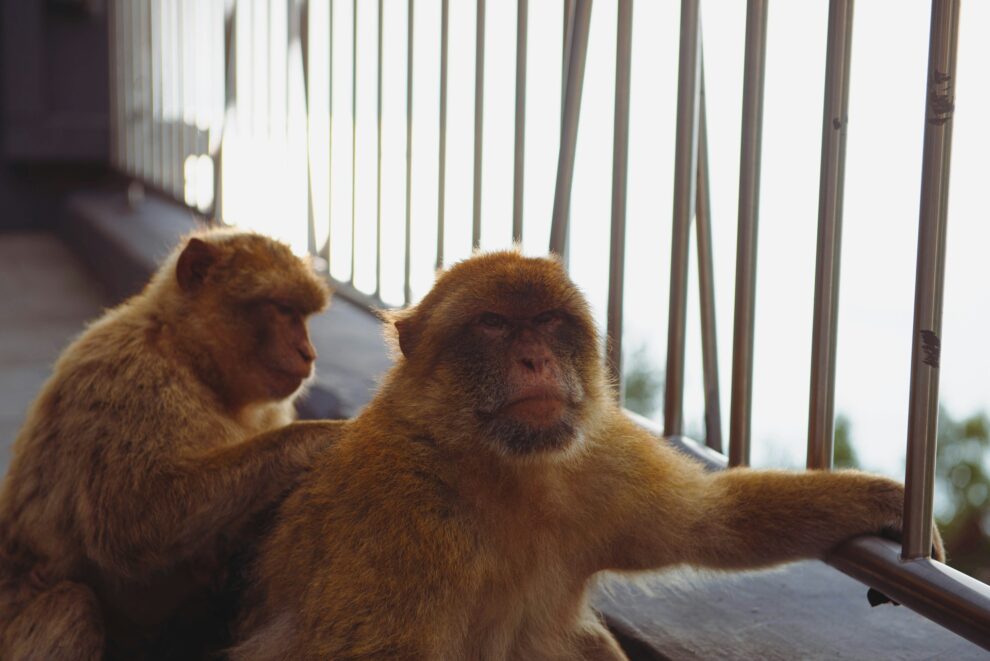Monkey calls ring out from a compound tucked away from the iconic vineyards and rolling hills of southern France, where one of the country’s key primatology centres is facing pushback over expansion plans.
The site run by the National Centre for Scientific Research (CNRS) in Rousset in the Provence region has for decades been raising hundreds of primates destined for laboratories to use in scientific experiments.
But a plan to triple the number of primates at the site to 1,800 by 2029 has been met with criticism from rights groups.
The CNRS, with the backing of the French government, says the move will cut costs compared to importing lab animals and allow for better oversight of conditions.
France and Europe have been looking for alternatives to source primates for experiments after imports from China and Africa halted due to the Covid-19 pandemic and prices skyrocketed to sometimes 15,000 to 20,000 euros ($17,000 to $23,000) per animal — a prohibitive cost for public research.
It’s a matter of “France’s research sovereignty”, the CNRS said in April.
But the France-based animal rights group One Voice says the project goes “against the course of history”.
The European Union has agreed to gradually phase out animal testing but has set no specific targets, and has banned cosmetic testing since 2013.
In response to criticism, the centre has held public meetings and this month opened its doors to AFP on the seven-hectare site.
Nestled in a pine forest behind barbed wire, tight security and discreet signage, enclosures of varying sizes house 300 olive baboons, 60 Guinea baboons, 130 rhesus macaques and 120 marmosets, all born in captivity.
In one of the outdoor enclosures, monkeys climb and groom each other among piles of boulders and tree trunks.
Nearby, a 20-year-old monkey called Babar mingles with his mates Bibi and Faustine, currently fitted with contraceptive implants, while Vanille, 11 months old, climbs on a wooden swing.
The site — to be redubbed the National Primate Centre (CNP) — has a budget of 31 million euros in public funds to triple its capacity.
Claire Duliere, head of the campaign against animal testing at One Voice, says the project was aiming for “profitability because it will be necessary to justify this use of public funds”.
But according to Ivan Balansard, head of the ethics and animal research models department at CNRS, the plan is “anything but profit-driven: it is the public funding the public”.
Keeping the operation in France allows for better monitoring of the animals’ living conditions and ensuring their well-being, CNRS says.
Each animal is due to have an average living space of 1.49 square metres (16 square feet), which exceeds EU requirements.
Established in 1978, the centre is one of three main public facilities in France that breed monkeys for experimental purposes.
Balansard said: “Our monkeys are used only in academic research and not in clinical research,” including at the National Institute of Health and Medical Research (Inserm) and the Pasteur Institute, with only a few private sector collaborations.
Some 3,500 monkeys were used for scientific purposes in France in 2023, including in neuroscience and immunology, according to the government. Most of them were eventually euthanised to spare them from excessive suffering.
It was not immediately clear how many came from Rousset.
But the centre said it aimed in the future to provide 30 percent of primates used in research in France.
The United States uses 60,000 monkeys for testing annually, while China had 240,000 in 2021, with 57 breeding centres, according to the CNRS.
A 2023 Ipsos survey commissioned by One Voice found that 74 percent of French people expressed opposition to animal experimentation.
Technological developments and artificial intelligence have contributed to a 3.8-percent reduction in the scientific use of animals in France between 2022 and 2023, bringing the annual total to around two million, the vast majority mice, according to authorities.
But “these substitution models cannot encapsulate the complexity of a living organism” for certain research, such as in oncology, the national academies of medicine, sciences, pharmacy, and veterinary sciences warned in 2021.
Monkeys have been used in the testing of key vaccines and treatments for diseases including polio, Ebola, HIV and Parkinson’s.

Add Comment